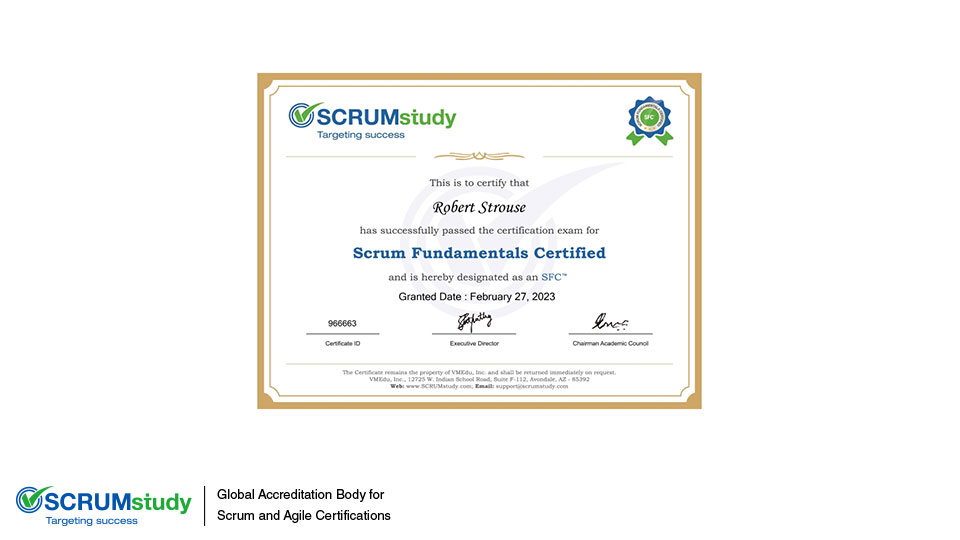Agile Scrum Master Exam Questions
Posted by SCRUMstudy® on June 17, 2024
Categories: Agile Certification SBOK® Guide Scrum Scrum Guide Scrum Master Training
Agile Scrum Master exam questions typically assess candidates' understanding and application of Scrum principles, roles, events, and artifacts. These questions cover various aspects of agile project management, such as sprint planning, daily stand-ups, sprint reviews, and retrospectives. Candidates are tested on their ability to facilitate effective communication within teams, resolve conflicts, and ensure adherence to Scrum practices.
Scrum Master Certification Test offered by ScrumStudy is a rigorous assessment designed to evaluate candidates' understanding of Scrum framework principles and their ability to apply them in real-world scenarios. The test covers various aspects of Scrum, including roles, events, artifacts, and values, ensuring comprehensive knowledge and proficiency. Candidates are tested on their capacity to facilitate Scrum ceremonies effectively, resolve impediments, and foster a collaborative team environment. Successful completion of the exam validates individuals as competent Scrum Masters capable of driving successful Agile projects. With a focus on practical application and theoretical understanding, this certification test equips professionals with the expertise needed to excel in agile environments.
The Scrum Master Certification Exam Questions are meticulously crafted to assess candidates' comprehension and application of Scrum principles and practices. These questions delve into various aspects of Scrum methodology, including roles, events, artifacts, and values. Candidates are tested on their ability to facilitate Scrum events effectively, foster collaboration within the Scrum Team, and remove impediments to progress. The exam evaluates understanding of agile principles, such as iterative development and continuous improvement. Mastery of servant leadership, communication skills, and conflict resolution techniques is also scrutinized. Ultimately, the exam aims to ensure that certified Scrum Masters possess the knowledge and skills necessary to guide teams towards successful project delivery using Scrum.
Earning a Scrum Master Certification offers a multitude of benefits. Firstly, it provides a comprehensive understanding of the Scrum framework, including its principles, roles, and practices, enabling professionals to effectively facilitate Scrum processes within their organizations. Additionally, certification validates one's expertise in Agile methodologies, enhancing career prospects and opening doors to diverse job opportunities across various industries. Moreover, becoming a certified Scrum Master demonstrates a commitment to continuous learning and professional development, positioning individuals as valuable assets to their teams and organizations. Overall, the Scrum Master certification exam benefits professionals by equipping them with the knowledge and skills needed to drive successful Agile transformations and deliver value to stakeholders.
We will attempt to do a quick overview of some of the Scrum certifications that are currently being offered.
Next, let's discuss how to choose the right Scrum trainer. While it can be beneficial to find a Scrum trainer with a similar background to yours, it is not an absolute requirement. The framework and style of Scrum training can vary from trainer to trainer, so it's important to find one that matches your learning style.
The biggest positive of a formal Scrum training is that you learn everything in a controlled environment. You meet people who are also there to learn about Scrum and in case you have common background, it helps to understand the process and difficulties of implementation from outsider’s point of view. A formal training also helps you understand about the mistake which you may make due to the traditional project management concepts rooted in you.
The main purpose of any certification is to impart a common baseline of the knowledge. These Scrum certifications, compared to any other project management certifications have a very easy test. You should remember that getting a Scrum certificate is way easier than the implementing actual Scrum framework.
Scrum and Agile methodologies offer significant flexibility in implementation. However, it's crucial to maintain the core principles of the process. Project managers who modify essential elements of Scrum are often referred to as "Scrumbut." It is generally recommended to adopt Scrum in its entirety initially to fully understand its mechanics. Once you have a solid grasp of the framework, you can then make informed decisions about potential adjustments. Over time, you may realize that no changes are necessary.
You need to understand that nothing is more valuable than experience. Scrum or Agile Certification may only add some credibility and marketability to the individual.

